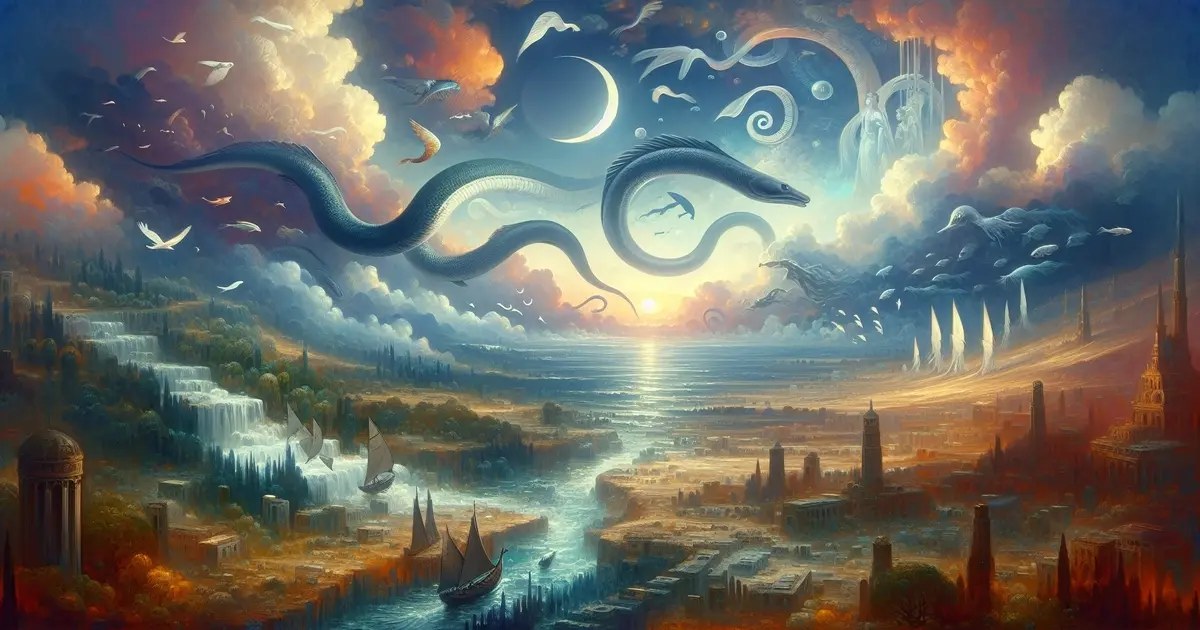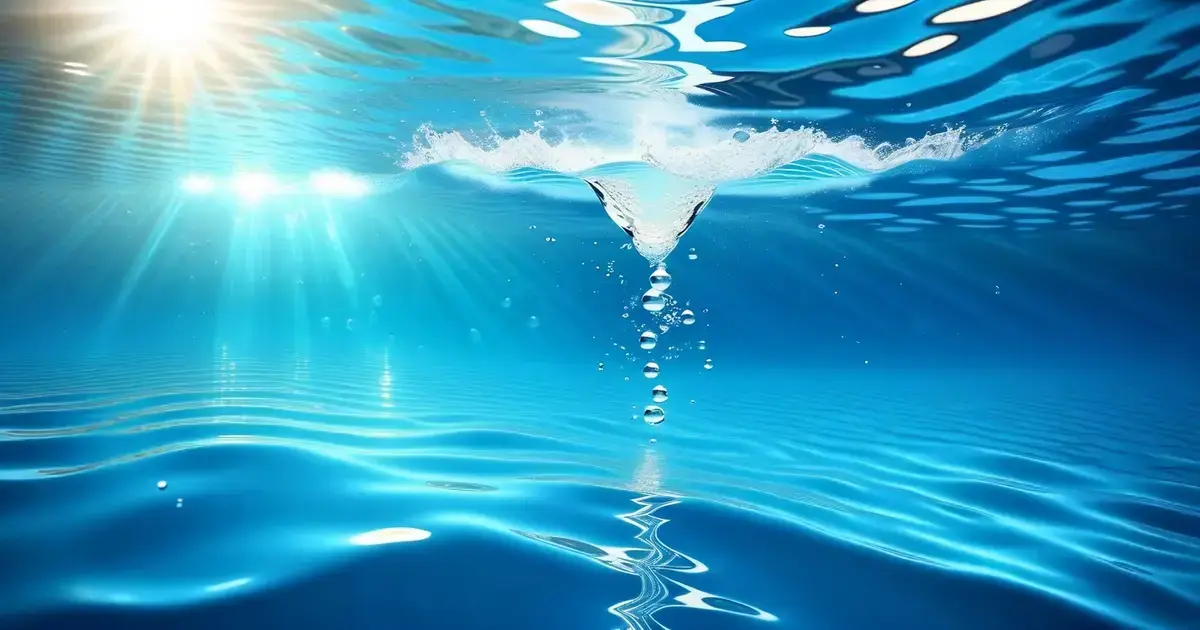Ocean Dream Meaning: Symbols and Interpretations
Discover the symbolic meanings and possible interpretations of dreaming about the ocean in diverse cultural and psychological contexts.

“ Calm waters imply equilibrium, harmony, and good judgment. “
Ocean dream means how the sea in a dream connects to emotions, transition, and mystery. Numerous accounts associate tranquil waters with serenity and defined objectives, whereas tumultuous waves indicate turmoil or rapid changes in one's life. Dark or deep water indicates submerged anxieties or desires, while clear blue water frequently suggests optimism or rebirth. Tides can delineate cycles, such as beginnings and endings, and shorelines can indicate boundaries or what is to come. Night seas indicate fear or doubt, while sunrise scenes suggest new plans. To interpret symbols effectively, observe the mood, color, weather, and your part in the scene. The following sections parse out common themes, symbols, and real examples to provide context.
Key Takeaways
- Ocean dreams mirror your emotional state and subconscious, varying from peaceful tranquility to turbulent anxiety or confusion. Consider the ocean's condition as a reflection of your mood and mental burden.
- Calm waters imply equilibrium, harmony, and good judgment. Leverage these dreams to redouble your gratitude practices and sustain inner-peace-supporting routines.
- Stormy seas emphasize conflict, worry, or unsettled matters. To regain control, pinpoint what's stressing you, establish boundaries, and implement practical countermeasures — like mindful breaths or quick breaks.
- Deep ocean scenes indicate latent fears or a desire for deeper self-exploration. Set aside moments for contemplation, journaling, or directed meditation to bring out wisdom and nurture development.
- Tidal waves represent overwhelm and swift transformation. Build coping skills, establish contingency plans, and streamline priorities to weather the transitions.
- Shoreline symbolism indicates transformations and the intersection of waking and dream desires. Identify repeating symbols, compile a dream glossary, and translate insights into relationships and goals.

The Ocean Dream Meaning
Ocean dreams often reflect the mind's depth and mood, with the calm ocean resonating with deep emotions and subconscious signals. Since Earth's ocean spans 70.8% of the surface and contains 97% of water, it's no surprise our inner world connects to this limitless ocean. Water signifies cleansing and newness in various interpretations, while in psychology, the sea can symbolize the unconscious. Use these dreams as a state check on your connections and boundaries with others.
1. Calm Waters
Calm seas in dreams indicate stable feelings and a life you navigate carefully. Cool, mirror-like water indicates harmony at home or in your job, and compassionate and equitable friendships. When the water is clear, many folks interpret it as clarity of mind, a reset of the soul, and even a silent 'ok' to agendas already afoot.
It can be a reminder to stop and savor what is going well. Gratitude shores resilience. In some Eastern perspectives, calm water indicates cleanliness, and in others, still water reverberates peace.
2. Stormy Seas
Rough waves, strong winds, or dark skies can signal struggle or tension brewing beneath. You may be contending with work pressure, an uncomfortable conversation you procrastinate, or root anxiety connected to finances or health.
Consider the storm as information. Inquire what felt out of control that day. Pay attention to who was with you in the dream. Then set small, precise steps: book the hard meeting, set a budget, or speak with a counselor. Storms come and go, but so do skills.
3. Deep Abyss
A deep descent or black ravine frequently characterizes the mysterious and submerged terrors. Diving deeper may indicate a desire to explore your inner self or initiate a spiritual quest. In Western thought, the ocean trails the unconscious. Diving the wreck or trench may be your mind seeking a locked-away memory, desire, or reality you exclude.
Use a journal to capture colors, creatures, and emotions upon awakening. Patterns relate to actual needs and subsequent actions.
4. Tidal Waves
Giant waves, on the other hand, represent immediate transition, emotional turmoil, or calamity. Being swept away might signify feeling diminutive as events whirl by, akin to swimming in a turbulent ocean—map triggers: a job shift, a breakup, or news cycles. Create buffers—sleep, brief strolls, breath work, or a support call. Get ready—as coasts brace for surges, saving strategies, and pacing decisions.
5. Shoreline Views
Strolling along the coast can signify a new period or a zeal on the edge of emergence. The shore stands between the conscious mind and deeper drives.
Shell-picking, crab, and fish-gazing can allude to messages, gifts, or debts. For Africans, the ocean connects worlds; for those in the Pacific, you may hear a summons for peace or travel. Ocean currents—moved by heat, salt, wind, and Coriolis—shape climate as habits steer moods. Dreams of the Pacific, Atlantic, or Arctic may color the tone: the Pacific for peace or quest, the Atlantic for trade-offs and ties, the Arctic for stark truths. Travel, freedom, and exploration are common themes – notice if you're facing the water or turning away.
Your Emotional Compass
Ocean dreams often serve as a silent anemometer for internal climate, reflecting our subconscious thoughts and emotions. They follow how you digest strain, desire, and transformation, manifesting through water, depth, and movement. Our past experiences with water—beloved beach trips, a drowning scare, or a passion for sailing—can skew this compass. Mood also plays a significant role; stormy weeks may reveal shipwrecks, while peaceful days still hold treasures. The core idea is simple: when emotions feel too big, dreams may place you in a calm ocean, asking if you can float, swim, or sink.
Patterns trump a one-off dream. Gliding through with calm strokes can indicate self-efficacy and reasonable emotional regulation. Drowning scenes tend to mirror overwhelm, such as work accumulating more quickly than you can keep up. Surfing and riding the wave might define adaptive coping strategies. Adrift in open water with no land in sight may announce the confusion accompanying major life transitions—relocating, career changes, or identity transformations. Choppy surf close to shore often connects to day-to-day stresses, while expansive, dark water can resonate with more profound anxieties or lingering loss. If the water clears after a storm, that might indicate advances in identifying and processing difficult emotions, leading to clarity in the depths of your subconscious mind.
- Calm sea at dawn: relief, clarity, readiness
- Rising tide around ankles: stress creeping up, need for limits
- Rip current pulling out: loss of control, urgent boundaries
- Tidal pool with marine life: curiosity, learning, safe exploration
- Giant wave on the horizon: anticipatory anxiety, big decision ahead
- Sailing with a crew: support network, shared goals
- Fog over open ocean: confusion, lack of data, slow down
- Swimming with ease: confidence, regulated energy
- Drowning or gasping: overload, ask for help, reduce inputs
- Whale sighting: awe, meaning, a call to look deeper
Context adds flavor to the significance of these dreams. Real oceans span 70.8% of Earth, contain 97% of its water, and power climate via currents like the Antarctic Circumpolar Current. That scale can manifest as immensity or strength in dreams, akin to a limitless ocean. The European Atlas of the Seas reminds us that coasts are like personal boundaries—they differ. Biodiversity—millions of oceanic creatures, from phytoplankton to blue whales—reflects the spectrum of your emotions. Water symbols vary across cultures and spiritual views, but one thread holds: naming fear, seeking support, and steady breath help you navigate the turbulent ocean of your feelings.

A Psychological Dive
Ocean dreams frequently indicate the inner world of the dreamer. In traditional symbolism, water represents the unconscious, so that a calm ocean can chart deep feelings, hidden impulses, and recollections. Carl Jung associated water with the subconscious mind, and diving under the waves can signify a quest for inner insight. Freud linked water to birth and fertility — being cradled or rescued in water can resonate as a desire for rebirth or a fresh start. Some male dreamers could interpret rescue by a female as a birth metaphor. Psychology Today adds a caring lens: water can mirror a mother bond or a wish to be held, which turns a dive into a call for support. In short, the psychological dive is examining what you feel, think, and do to understand why it emerges at the present moment.
Occurrences in the dream provide more hints about the subconscious thoughts of the dreamer. Diving might indicate courageous attention to complex subject matter, such as sorrow or embarrassment, or it could represent a quest for liberation and uncharted territory. In sailing, it manifests as an art of selection and timing, as when we trim a sail to a swell. It can suggest goal setting over a sprawling task landscape. Sharks often symbolize fear, hazard, or a razor competitor. Note their range, count, and your stance: a shark far off in clear waters differs from a pack circling in a tight cove. Deep water tends to denote the uncharted in ordinary existence, such as unread pages in an assignment. Tides can resonate with mood swings fueled by external tugs, just as the Moon tugs the ocean. Swell can serve as a metaphor for anxiety, so swell from a distant tempest can represent anxiety that originated elsewhere but now wafts to you.
Returning themes bear significance in the interpretation of the dream. A loop of storm crossings might reveal a persistent shift in emotional turmoil. Bathymetry—the map of depth—mirrors how you grade your layers: sonar-like checks, slow scans, and gaps where you still "know less than Mars." If you dream of boundaries—Pacific, Atlantic, Indian, Southern, Arctic—they can structure when you divide labor, household, and care obligations. Global notes, such as World Oceans Day or land and water hemispheres, can cue how you situate yourself within a bigger system—climate, family, and teams—where feedbacks guide your path.
Cultural Undercurrents
Ocean dreams lurk at the intersection of myth, psychology, and science. Cultures imbue the sea with moral heft and spiritual resonance, and oceanography accounts for the actual forces—currents, heat, chemistry—that carve out coasts and lives. Together, they frame what the ocean can mean in sleep: a vast field for fear, hope, memory, and change, often symbolized by calm ocean waters and the vastness of the limitless ocean.
Between continents and across cultures, oceans and seas, bays and straits—the broad expanse of the Pacific or a tiny bight—bear these stacked metaphors. Many Indigenous cultures read the sea as kin: provider, teacher, and clock for nature's rhythms. Water is sacred in African tradition, and the ocean is both a border and a bridge between the visible and invisible. To many eastern traditions, water symbolizes purification, surrender, and rebirth — stillness signals lucidity, while a flood may represent stagnant heartache yearning for motion. In Western psychology, the ocean frequently maps to the unconscious, with tides reflecting mood cycles and depths implying subconscious thoughts often hidden from everyday awareness. Popular culture reinforces these frames: films like Jaws amplify dread of what moves in the dark, while Waterworld channels collapse, drift, and survival.
Meanings float with locality and with experience. A fisherman by a windy gulf will dream of waves as labor and hazard. A coastal parent might be cheered, or concerned, to hear the Gulf Stream in the news, aware that it sculpts gentle winters across portions of Northwest Europe and North Atlantic storms. Scientific facts seep into dream tone: ocean heat content has climbed since 1970, with the ocean storing over 90% of excess heat. Surface warming and acidification from human CO2 emissions change reefs and food webs. These changes may tint dreams with wonder or fear. The deep sea, starting around 200 m where light dies away, remains a powerful symbol for the unknown. Its five pelagic zones, extreme cold and pressure, and achievements such as the Trieste descent to the Marianas Trench further fuel the mystique. Even the water column's stratified blend and the tug of gyres inspire pictures of drift, swirl, or lull. They connect these pictures to individual rhythms, ancestry, and home waters—from business-protecting bays to life-bearing coasts.
- Ocean water: cleansing (East), sacred bridge (many African), living kin (Indigenous), unconscious depth (Western psychology)
- Marine creatures: guides or omens; deep-sea types imply robust under pressure
- Tides and currents: fate, time, mood swings. Gulf Stream as a force of energy and danger.
- Bays and gulfs: refuge, trade, family ties, reduced wind and waves as safety
- Depth zones: layers of the mind; light to dark as insight to mystery
- Storms: conflict, climate worry, or needed release
- Calm seas at mean sea level: balance, pause, or a fresh start

The Ocean as a Mirror
Consider the ocean in dreams as a transparent readout of your world within. Several psychologists associate the sea with the subconscious mind, where unaddressed needs, fears, and desires lurk beneath. Water bears sacred gravity cross-culturally. In parts of Africa, the ocean is a gateway world, a liminal space between the visible and invisible. For certain Indigenous cultures, it mirrors balance with natural currents. These views point to the same idea: ocean dreams mirror your inner self and current life path.
Take water quality as an index of disposition. Calm, clear waters can indicate steadiness, focus, or an open trust in connection. Turbid or turbulent ocean waters suggest conflicted intentions, mistrust, or tension in your professional life. An unexpected tempest can signal strife, loss, or a transition you sense but haven't labeled. In a vast, dark body of water, it can mirror back the passion you haven't yet dealt with, just as the deep ocean, at 0–3 °C, varies little from year to year. Warm, luminous shallows telegraph vitality and sociability, like the photic zone where life flourishes beneath the sun. If your dream has vivid color changes, pay attention — ocean color in science relates to light, particles, and life, and in dreams can label mood and mental clarity.
Waves, tides, and currents correspond to the flow of your feelings. A consistent tide hints at persistence and discipline. Choppy surf might indicate mood swings or stress to adjust quickly. Just as a mighty warm current — like the Kuroshio that drives water toward the pole and structures food webs — can reflect scaffolds that push you ahead. A rip might represent a pull you did not select, like an abrupt relocation or a new position. Tides often mark cycles: deadlines, family phases, or a health plan. Significant life shifts — new city, career change, personal growth — frequently manifest as crossing a bay, leaving port, or catching a ridge of waves.
Put your dream in a broader context. Earth is a water-world, with 71–75% ocean cover, and crust forming at mid-ocean ridges where magma cools into pillow lavas. Coasts, reefs, and mangroves nurture and shield humanity — but confront sea-level rise and warming oceans. Exoplanet research, even NASA's work on ocean worlds, reminds us that water beckons life and beckons meaning. Your sea dreams work similarly: they surface needs, test resilience, and point to next steps.
Navigating Your Dream
Ocean dreams often point to the scale of your inner life and can reflect expansive emotions, the subconscious mind, and spiritual growth. The sea serves as a metaphor for the unconscious mind, bridging your daily state and deeper layers of thought. Across cultures, oceans carry significant weight—myths, gods like Oceanus in Greek lore, and beliefs that link water to creation and renewal. Treat this backdrop as context, not a rule. Your unique interpretation sits in your mind and body, allowing for a personal connection to the calm ocean water surrounding your subconscious thoughts.
Begin with small initial actions. Record the dream immediately upon waking and observe the scene—take note of the weather, the color, the depth, the sounds, and any sea life present. Write down who else was there and what you experienced physically—serenity, terror, or wonder. Mark the tides, waves, and shore forms: a bight (a broad, open bay), a steep slope, or a flat shelf. If you detected currents, identify them. Fast, deep flows could stimulate the Agulhas Current, which is rapid and robust on Africa's east coast. Use post-dream journaling to notice connections between dream scenes and your daytime stress or aspirations, as these reflections can reveal your inner desires and emotional turmoil.
Develop your own dream dictionary for ocean images. Smooth waters imply faith in life's currents, while a turbulent ocean might symbolize feeling unmoored or confronted with demanding, unstable expectations. The sight of a continental shelf or margin can evoke the boundaries between the secure and the unknown. Shelves are shallow zones once drylands in glacial lows, and the continental rise preserves turbiditic silts that drift up to 500 km. Sea ice—approximately 7% of our planet's surface—can indicate guarded yet stiff emotions. It travels with wind and tides, akin to how your emotions fluctuate with external influences. If you dream of the far seas—the Indian Ocean, young and deep—write it down, as big water can represent grand ambitions or the terror of magnitude.
Let your insights guide you to select small, crystal-clear moves. If the dream displays overload, establish a single boundary. If it demonstrates smooth drift, arrange a step toward a goal. If chaos reigns, find a peaceful 'harbor' habit—such as a 10-minute walk, mindful breathing, or a chat with a confidant. Review your weekly notes to identify trends and course-correct, ensuring that your emotional state aligns with your aspirations and the mighty ocean of your subconscious mind.

Conclusion
To interpret an ocean dream, keep close to the scene. Remember the color, the tide, the shore, and your stomach. A tranquil blue ocean may indicate comfort. A grey swell can forebode tension or transformation. A shadowy abyss can signal anxiety or mournfulness. Little signals direct the reading. An expansive horizon can reveal promise. Stormy seas can prove an examination. A slow dive can indicate a need to heal.
To test the fit, project dream bits onto your week. Employ a fast log: one sentence for every dream. Throw in time, mood, and memorable markers, like a storm, a reef, or a lighthouse.
To take action, choose a tiny step today. Share your dream, adjust your sleep, or set a clear goal. It's your call—go for it.
Frequently Asked Questions
Recent Dreams
Other Dreams
Read more dream interpretations
Dive into the realm of dreams. Explore various dream interpretations. Enhance your understanding of what your dreams could be telling you.
About the author
We provide insights to harness the power of your dreams, improving not just your nighttime narrative, but your daily life as well.
















